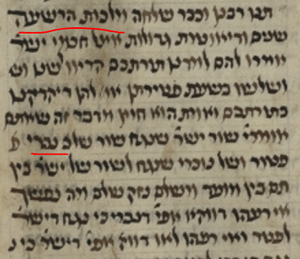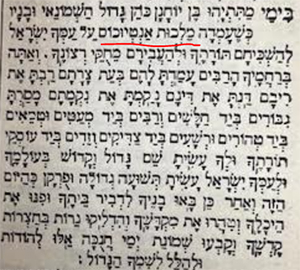
Today’s column presents topical thoughts on Daf Yomi, Chanukah, and the parsha. The common thread between them is non-disclosure and concern for negative misimpression. In a story on Bava Kamma 38a, a brayta relates that the Kingdom of Rome (מַלְכוּת רוֹמִי) sent two military officials to the Sages of Israel, ordering them to teach them the Torah. They learned the material well. At the time of departure, they said “we’ve examined your entire Torah and it is true, except for this one matter,” that matter being the law discussed on our daf, of a disparity in liability for an ox goring another ox, when the damager and damagee are Jew or gentile. Nevertheless, we won’t inform the kingdom.”
The parallel Yerushalmi, Bava Kamma 4:3, has a few differences. It’s the kingdom (המלכות) sending to Rabban Gamliel. The brayta enumerates other objectionable disparities, and Rabban Gamliel effectively eliminates one of them via decree, predicated on chillul Hashem concerns. The officials declare they won’t inform the kingdom, but nevertheless forget everything they’d learned by the time they reach the Ladder of Tyre.
Interestingly, we only see “Kingdom of Rome” in the Vilna (circa 1870’s) printing. The Soncino and Venice printings, and the Firenze 8-9, Hamburg 165, Munich 95, Escorial, and Vatican 116 manuscripts all have מלכות הרשעה, “the Wicked Kingdom.” I’d guess that it was clear that the government in question was Rome, and that הרשעה was edited out by the Christian censor, because of Rome/Christian associations. Rabban Gamliel II operated during the time of the Roman Emperor Domitian, who persecuted Christians. This was well before Rome adopted Christianity as its official religion. In a similar act of censorship, while manuscripts all have שור של נכרי, the Vilna printing turns this into a Canaanite’s ox.
Kingdom of Antiochus
To relate this to Chanukah, in the back of the Torah Temimah Biblical commentary, there is a siddur.
My father notes an interesting variant in the “Al Hanissim” prayer. Where we have the Wicked Kingdom of Greece, מלכות יון הרשעה, they have the “Kingdom of Antiochus” without a “wicked” descriptor. My father suggests, based on a supplicative introduction to the book, that this change was due to censorship concerns. Since it was printed in Russia, and a very common gentile Russian name is Ivan, they were worried about the prayer describing the Kingdom of the Wicked Ivan, and so engaged in self-censorship. I’d add that the first tsar was Ivan the Terrible.

Evil Report
In Vayeshev, the Torah relates that Yosef relayed דִּבָּתָם רָעָה, an evil report about his brothers’ activities to his father, but does not specify what the brothers did wrong. It could have been simple brotherly wrongdoings, like Reuven made fun of Shimon, or shoved him, but it’s seemingly left out of scripture. The midrash specifies various religious wrongdoings, or suspicion thereof, e.g. eating a limb of a live animal. Each can be deduced by from a close reading of Bereishit 37:2, e.g. from אֶת אֶחָיו בַּצֹּאן, combined with the theological and hermeneutical principle of middah keneged middah (an eye for an eye), such that Yosef’s later punishments mirror his faulty accusations. Even peshat-oriented commentators look to details in the verse to deduce the nature of the wrongdoing. Thus, Ibn Ezra points to Yosef being improperly made an attendant (נַעַר). Others seem to take an open-canon approach to the brothers’ wrongdoing, an approach to peshat I favor. I’m reminded of Rabbi Yehuda ben Beteira’s reaction to Rabbi Akiva’s exposition of Tzelophchad’s sin, in Sifrei Bamidbar 113, עתיד ליתן את הדין כל האומר צלפחד מקושש היה. אם מי שאמר והיה העולם כסה עליו, ואתה מגלה עליו.
However, I’d argue that the brothers didn’t sin at all, and Yosef didn’t slander them either. The mistaken assumption arises from several factors. (a) דִּבָּתָם רָעָה means that he relayed “evil” rumors to his father. (b) דִּבָּתָם itself means evil reports, as it is used across Tanach, such as the dibah the scouts brought about the Land of Canaan. (c) these evil words are a partial basis for his brother’s hatred.
My retort is that (a) means that he relayed the grazing report to his father, since in context he served with his brothers in grazing, הָיָ֨ה רֹעֶ֤ה אֶת־אֶחָיו֙ בַּצֹּ֔אן. The shoresh רעה is identical. The reason this is mentioned here is foreshadowing and to set up the eventual circumstances of the later story when he is sold. When Yaakov later tells him רְאֵ֜ה אֶת־שְׁל֤וֹם אַחֶ֙יךָ֙ וְאֶת־שְׁל֣וֹם הַצֹּ֔אן וַהֲשִׁבֵ֖נִי דָּבָ֑ר, to check on the welfare of his brothers and of the sheep, and to report back to him, this is precisely Yosef’s regular role. This type of setup and foreshadowing occurs in Tanach, such as when Avraham is informed (Bereishit 22:20) that Milkah has born sons to Nachor, with a genealogy leading to Rivkah, who will be relevant later; or explaining the setup of the shepherds gathering to roll the large stone off the well together (Bereishit 29:3) in anticipation of the later act of Yaakov in removing the stone.
As for (b), if דִּבָּתָם itself conveys something evil, why modify it with רָעָה? Now, other contexts in Tanach tend to convey negative speech, especially when one is motzi that dibah. Bamidbar 13 uses וַיֹּוצִ֜יאוּ דִּבַּ֤ת הָאָ֨רֶץ֙ and Bamidbar 14 has the scouts as מֹוצִאֵ֥י דִבַּת־הָאָ֖רֶץ רָעָ֑ה, so note motzi, though also note רעה. Other negative usages of דבה also employ other roots which are typically neutral, such as הַגִּ֙ידוּ֙. It’s the context which tells us the negative implication. Further, the biblical corpus provides a limited view of biblical Hebrew vocabulary and word senses, and spans several centuries; I don’t know that a survey of six instances can conclusively define a root.
As for (c), consider that דְּבָרָֽיו appears after חֲלֹמֹתָ֖יו. While Rashi and Rashbam relate it to the aforementioned dibah, Haamek Davar, Or Hachaim, Rabbeinu Bachya, Seforno and others explain it as Yosef relating his dreams to them, among other associated explanations (e.g. bragging, speaking to them against their will). Then, there’s no corroboration of a separate slander, the details of which aren’t provided. Rather, it was a baaaa’d report.
Rabbi Dr. Joshua Waxman teaches computer science at Stern College for Women, and his research includes programmatically finding scholars and scholastic relationships in the Babylonian Talmud.










